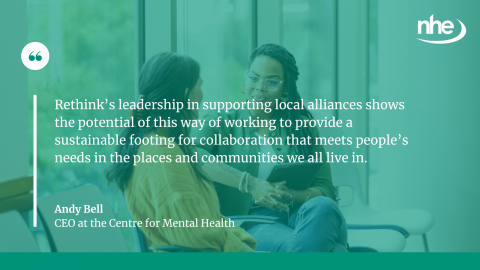The NHS should build stronger partnerships with the voluntary and community sector if it wants to provide better and more trusted mental health care, according to a new three-year review.
The report, led by the Centre for Mental Health, looked at a series of ‘alliances’ established by the charity Rethink Mental Illness using funding from the Charities Aid Foundation.
The evaluation — More than a sum of our parts — examined the impact of these alliances in Coventry and Warwickshire; North East Lincolnshire; Sheffield; and Tower Hamlets.
It found that these services allowed their output to be tailored by those with lived experience of mental health issues, thus making services more effective and accessible.
This can help professionals reach the people who are often overlooked such as LGBTQ+ and those from racialised communities, ultimately stopping patients from falling through the cracks.
The doubt cast around long-term funding is hampering the sector from fully realising its potential, though.
“Voluntary and community sector organisations are more widely trusted by people with mental health difficulties who have had bad experiences with a range of statutory services,” said Andy Bell, CEO at the Centre for Mental Health.
“But they are hampered by insecure contracts, short-term funding and bureaucratic processes that stop them fulfilling their potential.”

The report sets six recommendations for national and regional organisations, including how:
- integrated care boards (ICBs) should resource, develop and support mental health alliance work;
- the Department of Health and Social Care (DHSC) should incorporate the broader principles of mental health alliances into its health and social care strategy;
- NHS England (NHSE) should secure a commitment from ICBs to provide ongoing and sustainable resources for mental health alliances;
- NHSE should issue better guidance around commissioning, work proactively to reduce barriers to collaboration, and introduce light-touch access to community mental health transformation funding for grassroots organisations, to ultimately encourage integrated care systems to develop networks of mental health alliances;
- NHSE should hold systems accountable for already existing guidance to work in partnership with people and communities; and
- the DHSC should establish a national evaluation and learning framework that assesses the impact of mental health alliances and focuses on improvement.
“Collaboration is essential for the future of mental healthcare,” explained Mark Winstanley, Rethink Mental Illness’ CEO. “Working in partnership, we can ensure that more people receive effective care when they need it.”
He added: “Services must be designed with input from those with lived experience to ensure they best meet their needs, striving for greater equity so no one is left behind. This evaluation also highlights the valuable role of the voluntary sector, and we hope the pioneering efforts in the trailblazing regions can be expanded nationwide.”
Securing sustainable funding is an issue that Toby Porter, CEO at Hospice UK, highlighted for the latest edition of the National Health Executive digital magazine. Click here for his insight.
Image credit: iStock



















